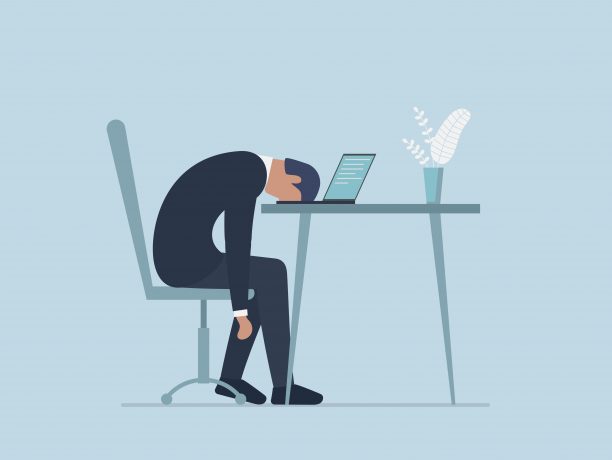Lawyers are not known for their healthy work-life balance. They’re reluctant to take time off sick – even more so when working from home. With the onset of colds and flu, in addition to Covid-19 infections, how should firms handle staff who work through illness? Adam McCulloch investigates.
Normally, people feeling under the weather would call in sick and spend the day recuperating. But with so many people working from home, employees may feel more inclined to continue to try to prove their usefulness and productivity. The sight of a laptop lying unused can be too much.
Competitive and dedicated staff, such as those found throughout law firms, may be particularly prone to this behaviour. But experts from academic, legal and psychology backgrounds are adamant that they should resist it.
Research has shown that people who regularly work from home continue to toil away despite being ill and take fewer sick days off then office-based staff. This is known as sickness presenteeism, a phrase with negative connotations but some might argue that if employees can work safely despite not feeling well, as long as they are not risking passing on the illness to others, they should do so. Some may even fear that without a daily sense of purpose their condition may deteriorate.
Alison Collins, reader in leadership and management, Manchester Metropolitan University, writes that people who work from home also tend to take fewer sick days than office-based staff and notes that many people like to be able to work from home while ill, as it allows them to keep on top of their workload while avoiding the strain of commuting.
However, she adds, if people feel pressurised to work, despite being ill, research suggests it can have negative consequences for the employee and the company. Studies have found that workers diagnosed with acute respiratory illness or influenza during the 2017-18 influenza season were more likely to carry on working if they could work from home than those without the option. But such illnesses require rest and time away from work pressures to recover properly.
Collins says that although employees can still work with minor illnesses such as colds, “workers and employers need to be aware of the potential health risk of working through health conditions that require rest and time to recover”.
The psychology of paranoia
She points out that working at home makes it harder for managers to see when employees are ill – so they are less likely to tell people to take sick leave. Employers need to actively encourage employees to take time away from work.
This may be particularly true when it comes to Covid-19 with its variable and inconsistent symptoms. It is widely established that among its main indicators are high temperature, a new continuous cough and a loss of sense of smell or taste. But many have tested positive despite a lack of clear symptoms or a suspicion they just had a common cold. As the autumn rolls forward into winter it could be that many develop a slight paranoia over how they feel at any moment.
Added to this, many more people than normal are getting flu jabs. These commonly have side-effects similar to a mild flu. These symptoms again can be confused with Covid-19.
All this leaves managers in a delicate position with their remote workers; they must guard against employees’ temptation to continue working at all costs, but also ensure that the organisation continues to be productive.
Where does this temptation come from? Business psychologist Sarah-Jane Last, founder of The Work Psychologists, explains why for some people, stopping working for illness is so difficult: “It’s a lot easier to keep going. They don’t want to stop because that would make them think about other problems, whether its illness or other aspects of their lives. This is very common in high performing, high achieving people. And there are a lot of people worried that they’ll lose their job.
“Everything’s being artificially propped up,” she tells People in Law. “You only see people on Zoom; you don’t see the real person. The longer term impact of a heavy cold will affect your performance. It doesn’t matter what you’re ill with.”
Beware the insecure overachievers
The Work Psychologists’ Alison Hall, a former lawyer, says that this is a particularly pertinent issue in the legal sector: “When your worth is measured in billable minutes, long hours become the norm. The all-too-common reality is that it is simply not possible to get through your workload without pulling 10-hour plus days. In a crowded service industry, the knowledge that there is another firm hovering in the wings, promising to turn the work around quicker and for a lower fee, is always hanging over you.
“This intensifies the gruelling working practices seen in many law firms. Add in an uncertain economic outlook and stories of redundancies and fee earners being managed out the back door, stopping working for illness may not just seem difficult – it can feel impossible.”
She says the law sector lures a significant number of “insecure overachievers”, a term that describes exceptionally capable, ambitious people driven by a belief in their own inadequacy. In addition, she adds, the managers of these insecure overachievers are required to juggle their people responsibilities with their own sizeable client workload. “It’s no wonder the ‘I need to stop’ conversations are rarely had,” says Hall.
Sarah-Jane Last says that Google’s work in developing the concept of psychological safety under its Project Aristotle has provided insights that organisations should take on board.
“It means ‘do you feel able to tell your leader how you really feel?’. Where there’s no psychological safety, people feel under pressure to continue working come what may. Old-school leaders still think the more they push someone, the better it is for the company.”
Fortunately, she says, “younger people tend to have a different attitude … self care and reaching out for help is much stronger among people in their twenties and thirties.”
People have to be told
Employment law specialists warn against the urge to continue working. Vanessa James, partner at Ashfords, says: “In the legal sector, it is commonplace for fee earners to maintain an email presence and to continue to engage with clients and colleagues during periods within which they are feeling low or unwell.
“This leads to fee earners often attending work or working from home when, in fact, they should not be working at all. This is endemic in the legal profession as a whole and really commonplace across all kinds of firms regardless of their size, location or practice area.
“In my experience, the pressure to continue to work and/or the resistance to log off does not always stem from the employer – who is often supportive – but from a desire to please the client. Fee earners in law firms have a client-facing role and often feel an obligation to meet their client’s requirements at all times, even when a client would be understanding of the situation and could be supported by a colleague.”
Employees who are clearly sick ought not to be encouraged to work – even if they are at home. It is commonplace for people to still want to work from home when they are sick but the employer must not be seen to enforce this nor to encourage those employees.
Echoing Collins’ warning about working through health conditions that need recovery time, James warns: “Employers who do pressure, or even persuade sick employees to work could find themselves being blamed for any later health deterioration or, if the health reason related to a disability, there could be liability arising under the Equality Act.”
Chris Cook, partner and head of employment and data protection at SA Law, says high workloads and tight deadlines all cause legal firm employees to work when perhaps they shouldn’t. He says: “Employees working in law firms in particular are known for not having an equalised work-life balance which may be linked to their reluctance in taking sickness leave.”
A question of quality
Cook cites research from Nottingham Trent University that found sickness presenteeism was adversely linked to job satisfaction and work engagement. Cook adds: “The quality of work done by people while they are sick is often a lower standard than what is normally expected of them.
“Research has shown that working while sick can increase the chances of being unwell in the future which in turn, increases the risk of workers having to take additional time off.”
For Cook, it is vital for employers to focus on their duty of care towards their employees’ wellbeing. He says they must bear in mind that if an employee feels they are unable to carry out their daily tasks due to illness at work, it is unlikely they will be able to do so at home. “It may also be important to the company culture,” says Cook, “to promote a positive environment dedicated to employees’ health and wellbeing. Therefore, encouraging an employee to work from home while sick may not produce desired results for both parties.”
“It is important to have an open conversation with employees to determine what they do/do not feel comfortable doing while on sick leave so that there is transparency between both parties.”
It must be hoped that a high proportion of employers and employees will heed this advice as public anxiety and confusion over symptoms rises over the coming months. Illness affects quality of work and committing to a series of pressurised work tasks can delay recovery. Under-the-weather employees must learn to ignore the lure of the laptop.











